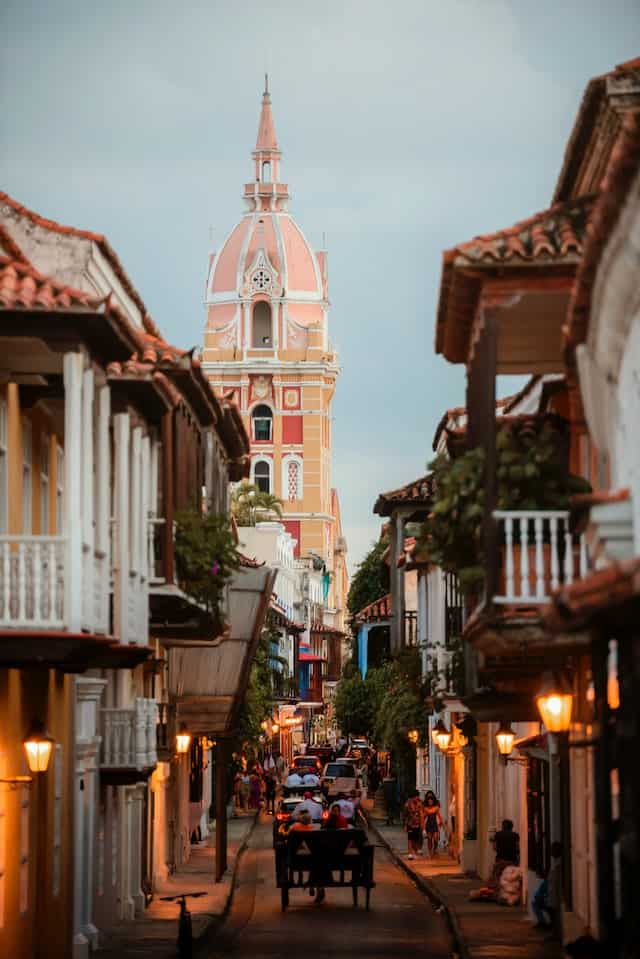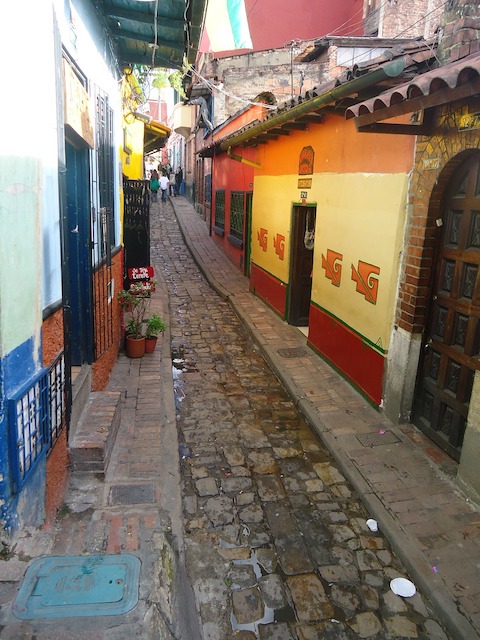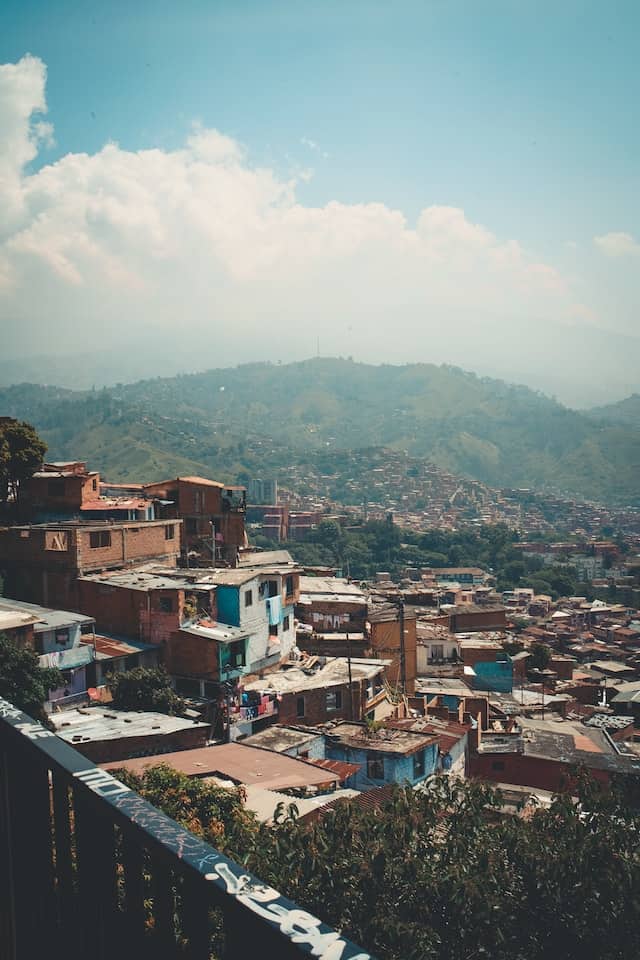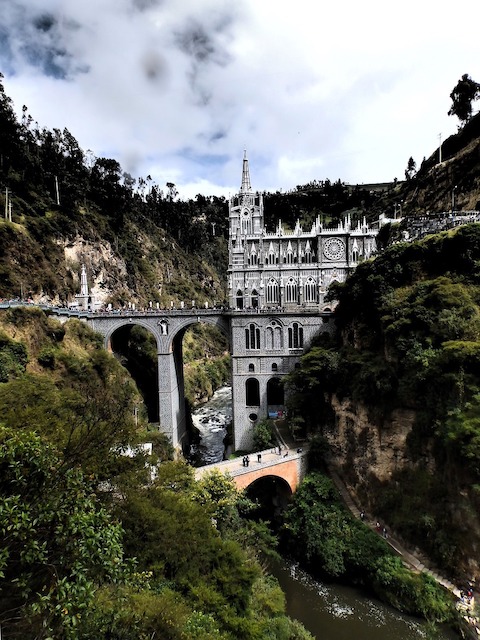Find everything women travelers in Colombia need to know about health, romance, women’s rights and safety.
All the information below is provided by Pink Pangea community members based on their experiences abroad. Get involved and add your voice now!
Health
Feminine Hygienic Products
Philia says: You can easily buy feminine hygienic products at the supermarket or drugstore. The most known brand is called Nosotras. I did notice that tampons are not as common as pads.

Birth Control
Philia says: Birth control is legal and can be taken orally or by injections at the local drugstore. It should cost between 18.000-20.000 pesos.
Recommended Gynecologists and Doctors
Philia says: Gynecologists in Bogotá are very similar to the ones back home.

Tips for Women Travelers in Colombia
Breastfeeding
It is not really acceptable or common to breastfeed in public in Bogotá. You’ll want to breastfeed in private.
Romance
Dating Locals
Philia says: Traditionally, the Colombian guy will always pay for the first date. They will typically come and pick you up at your house. Women should look out for those men that act too charming as they are most likely players.
Men
Philia says: I believe there are many different types of men all over the world. However I did notice that many Colombian men can be players, and have trouble with commitment. They will sweet talk to you and get you to believe anything. Some of these guys actually already have a wife and even kids.
LGBTQ Friendly
Philia says: In the bohemian areas as well as at universities in Bogotá, it is very LGBTQ-friendly. The elderly crowd is not accepting.
Women's Rights
Women’s Rights
Philia says: In Bogotá, both genders are equal. However I have been told that outside of the city there is more machisimo. The man goes to work while the woman stays at home.

Local Women
Philia says: Some clear cultural differences are that I unintentionally draw more attention to myself than local women do. My voice is loud in public and I am always lost in the streets. I would say that the local women in Bogotá are very similar to women in the States.
Perception of Foreign Women
Philia says: Colombians are very fond of foreigners. I always get tons of stares when I go out in the city. I get the occasional shoutout of some Asian country like “Japon!” (Japan). Colombians love foreigners because they love to say they know someone outside of the country.
Safety
Transportation
Philia says: Women should never take cabs late at night by themselves unless it is through a company such as Tappsi or Uber.
Shady Areas for Women
Philia says: In all areas of the city, and always at night.
Clothing
Philia says: There are no rules about what women should wear or not wear. Most Colombian women have very fashionable taste in Bogotá. You will rarely see anyone wearing sandals or flip flops as the weather is cooler.

Tips for Women Travelers in Colombia by Jenna Meguide
I came to Colombia because I wanted to learn Spanish in a place where I wouldn’t be able to resort to speaking English. I wanted to immerse myself in the culture, and not just be sucked into the usual tourist machinery, spat out the other end, my bank account empty and my understanding of culture unchanged.
Colombia has lived up to my expectations, and has taught me things I never expected. Here are six things I learned while living in Colombia:
Living in Bogota: 6 Things I Wish I Knew
1. Don’t slam the car door.
I mean it. It turns out that cars in Colombia are generally less robust than their North American counterparts (which I have been blithely slamming for years), and there is a widespread fear among taxi drivers and car owners that even one especially vigorous door closure could structurally damage the car.
I am still not entirely convinced that this is a rational fear–if I can damage the car that easily, what is to become of it in an accident?—but all of the disgruntled muttering is probably sufficient grounds to treat the door gingerly.
2. Do not wear sandals.
From the point of view of Bogota fashion, women wearing sandals are committing a fashion faux pas on the same scale as walking around with a bag on their heads. More importantly, Bogota is one of the highest capital cities in the world, and while it’s true that Caribbean beaches and tropical jungles are just a short plane right away, at 2100 meters it gets cold.
Even if you’re accustomed to colder parts and aren’t especially concerned about conforming to the rigid normative system of footwear in Bogota, wandering around the streets in open-toed shoes and short sleeves is a great way to mark yourself as not just a tourist, but a clueless one–at which point you may as well write in permanent marker on your forehead: “I have lots of money and no idea what’s going on.”
Also, while we’re on the weather, buy an umbrella. Between the months of April and June, and again in September through November, it rains. A lot.

3. Don’t believe all the security advice that people give you about living in Colombia.
During my first week of living abroad, I was given the following advice by a variety of well-meaning and hyper-protective Colombians:
- Never walk alone in the city
- Never go out after dark, never talk to people
- Not to answer people when they talk to me
- Don’t bring anything with me when I go out
- Not to buy anything on the street
- Not to touch any pieces of paper that people may try to give me
- If someone tries to talk to me or touch me, to scream loudly and not stop until the police arrive.
As well as being a terrible way to travel, a state of constant low-grade paranoia prevents you from developing a sense of what the real risks are and how to deal with them.
There are a lot of things you can do to keep yourself safe in Bogotá, but the two most important ones are to trust your instincts and to talk with local and long-term expat women about what they do to keep safe.
In general, Colombians have a highly specialized sense of which neighborhoods are safe, and where you need to be more careful. If you can get people to move past the urge to be hyper-protective of foreign women (especially those traveling alone), people have very accurate and insightful advice.
4. If Colombian men start rapping freestyle about you in Spanish, play it cool.
If you blush, they’re only going to start rapping about how they have made you blush, and then the entire bus will look at you, and it will become exponentially more awkward.
There is a convention in Bogota of people without stable incomes coming onto the public buses to sell candy or assorted trinkets, to perform songs on the guitar, or, occasionally, to freestyle. Normally, passengers are given the proffered merchandise and expected to listen to a small speech about the merits of the product in question or the circumstances which caused this person to be without stable work.
People are generally good-humored about taking proffered merchandise (although it’s okay to politely refuse), and then either buying it or returning it once the presentation is over. In musical acts, unenthusiastic but obliging audience participation is the norm.
If you can be visibly recognized as a non-Colombian, you will most likely receive a bit of extra attention, but as long as you are polite and do not think you are being given free candy on the bus, there’s no problem.
If someone composes an entire song about you (especially likely if you’re blonde), you’re probably going to appear a bad sport if you don’t give them at least a couple hundred pesos (roughly 10 cents in North American currencies).
5. Don’t eat the leaves.
Bogotanos are on the whole so welcoming, friendly, and eager to learn about your culture and show you theirs that it probably won’t be too long before someone invites you to their house for a meal. If it’s a weekend, you’ll probably eat tamales, which, if you’re not acquainted, are delicious corn-meal based dishes with meat and vegetables that come beautifully wrapped in plantain leaves. Which you’re not supposed to eat.
It’s never happened to me while living in Colombia (at least, not that I’ll admit on the internet), but everyone seems to know some expat who was invited to dine with a Colombian family, and, trying to be polite when being presented with Colombian food, gamely proceeds to eat the tamale, plantain leaves and all.
The story is always the same, right down to the expat claiming to think the leaves are delicious and then becoming extremely embarrassed to discover they have been doing the Colombian equivalent of eating their plate. In my experience, when presented with confusing food or drink, it’s always less awkward to ask what you’re supposed to do than to oblige someone to intervene once you’ve already started doing something weird or inappropriate.

6. Relax.
In my experience, apart from slamming the car door, there are very few culturally insensitive things you can do that won’t be quickly forgiven once it becomes clear the error was made out of ignorance, not malice. Colombian people—at least, the Colombians I know— are direct, friendly, forgiving, and love to laugh.
They are aware of all the hype and bad press surrounding their country, and relish the opportunity to welcome newcomers and show them the Colombia that is real for them—the richness and breadth of foods, cultures, and traditions, and the warmth and resilience of the people.
Tips for Women Travelers in Colombia by Kach Howe
What do you wish you knew before you went?
I wish we had done some research, so we might have known that not all of Colombia is tropical. We sent all of our warm clothes home with Jonathan’s sister when she visited us, and now we’re living in Bogotá at 2,640 m (8,660 ft) and it’s cold!
Jonathan cut the sleeves off most of his shirts and t-shirts in Costa Rica and I only have flip flops. I have a good excuse to go shopping though, so it’s all good in the end!
Any favorite restaurants/hotels/hostels/sites you’d like to recommend? Tell us what made them great!
Our one favourite place in the whole of Bogotá is a family-run boutique hotel where we spent three nights before moving into our own apartment. Hotel Cottage La Colina is owned by a mother and son and is like a luxury home away from home. On a hillside just outside of the city, away from the traffic, noise and pollution, La Colina is like a little haven of peace.
Everyone in the family has been an artist or involved with art and the entire property is like being in a private gallery of abstract paintings and eclectic sculptures. Our evenings were spent in the living room around the fire with Marta and Federico, with a glass of wine and a lot of great conversation.
All of the food was home cooked and incredibly delicious. The best thing about staying here, though, was the energy and atmosphere. If you come to Bogotá, then plan a couple of days outside the city and stay here. You’ll be glad you did!
Is there anything that women specifically should know before they travel to your destination?
The most important thing to know, as a woman travelling in Colombia, is that you are safe. There will always be areas not to walk alone late at night and the occasional comment or wolf whistle no matter where you are. Simply take with you the same common sense you would take anywhere else and you’ll find all Colombians, men included, to be extremely respectful, friendly and helpful.
The next important thing to remember, is that Colombians love to dance! If you go out and people are dancing, you’ll probably be asked to dance, but that doesn’t mean they’re looking for something else. In a salsa club in Cali, you’ll see everyone dancing with everyone and changing partners 20 times in a night. They really love to dance!
Tips for Women Travelers in Colombia
Related Reading
Do you have tips for women travelers in Colombia? What were your impressions of the country? Email us at editor@pinkpangea.com for information about sharing your experience and advice with the Pink Pangea community. We can’t wait to hear from you.
Photos of Tips for Women Travelers in Colombia by Unsplash.
